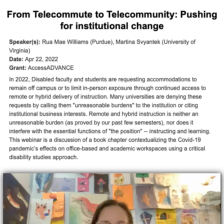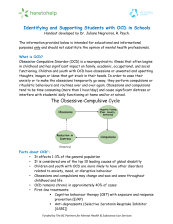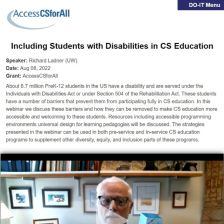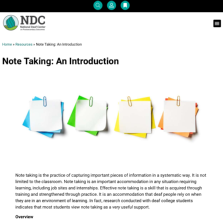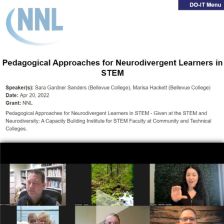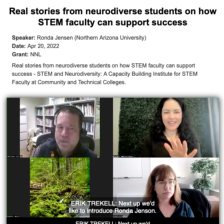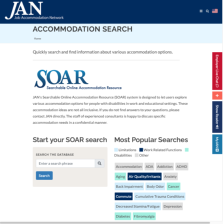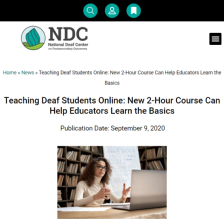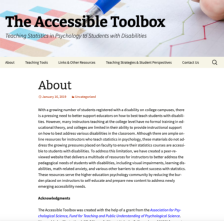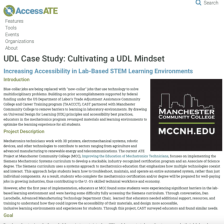Tools
Education -- Inclusive practices in the classroom
Resources | |
|---|---|
In this webinar from DO-IT, Rua Mae Williams and Martina Svyantek discuss a book chapter contextualizing the Covid-19 pandemic’s effects on office-based and academic workspaces using a critical disability studies approach. Continued access to remote and hybrid instruction is a core discussion point, since many people with disabilities need these...
This handout provides information for educators on identifying and supporting students with obsessive compulsive disorder (OCD). The resource defines OCD, lists facts, explores common obsessions and compulsions in children and youth, examines OCD's impact on performance and learning difficulties associated with OCD, provides examples of OCD...
In this video from DO-IT, Richard E. Ladner discusses barriers to computer science (CS) education for students with disabilities and practices to make CS education more accessible. Ladner explores demographics on disabilities in the United States, the number of students with disabilities taking CS courses, case studies of students with disabilities...
This resource, from the National Deaf Center on Postsecondary Outcomes, provides information on note taking as an accommodation for Deaf individuals in higher education. A document is provided, which explores the benefits of note taking, who can take notes, training opportunities, and legal aspects.
In this webinar from DO-IT, Marisa Hackett and Sara Gardner Sanders explore pedagogical approaches for neurodivergent learners in STEM. Hackett and Sanders discuss the difference between identity first and people first language, the importance of avoiding euphemisms, what neurodiversity is, the models of disability, the ten principles of disability...
In this webinar from DO-IT, Ronda Jensen from Northern Arizona University highlights ways in which STEM faculty can support neurodiverse students. Jensen highlights the Discover Your Neurodiverse Advantage in STEM (DYNA STEM) grant; background research; guiding perspectives and assumptions; perspectives from neurodiverse students about their...
The Job Accommodation Network's (JAN) Searchable Online Accommodation Resource (SOAR) system is "designed to let users explore various accommodation options for people with disabilities in work and educational settings." Users can enter in search phrases or choose from a list of popular searches. Search results can be narrowed down according to...
Teaching Deaf Students Online, a new self-paced professional development course, can help you adapt your online courses to ensure that they are accessible and inclusive. It is now available in the free online learning library of the National Deaf Center on Postsecondary Outcomes (NDC).
In just two hours, gain a basic understanding of accessible...
This resource kit, created by Mount Holyoke College, provides various tools for teaching statistics in psychology to students with disabilities, including visual impairments, learning disabilities, neurodiversity and math related anxiety. In addition to articles, research, and interviews with students, the site also includes teaching tools and...
This case study explores CAST's partnership with Manchester Community College, which aimed to remove barriers to learning in laboratory environments through employing Universal Design for Learning (UDL) principles and accessibility best practices. The case study focuses on Manchester Community College's Improving the Education of Mechatronics...
| |
| ← Previous | Next → |
